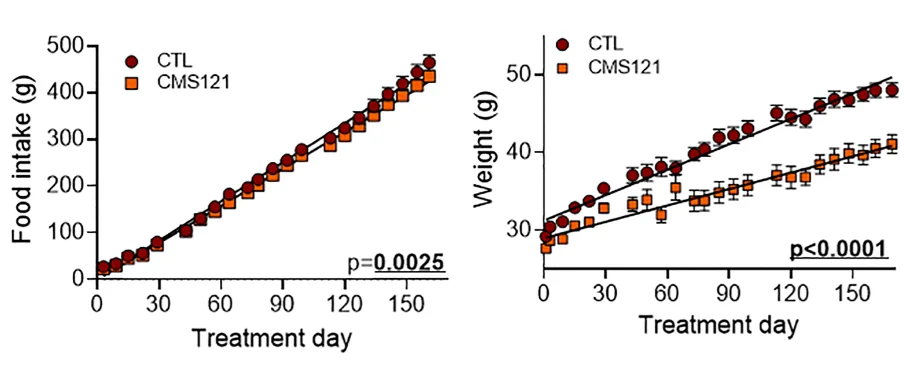According to a paper published in Aging, a fisetin derivative that is being investigated for brain protection may also be effective in controlling glucose and ameliorating obesity.
Repurposing a repurposed compound
CMS121, the focus of this study, was created by modifying fisetin, a flavonol that is well known for its effects against cellular senescence. CMS121 was originally investigated for its effects in protecting the brain from age-related damage, and it demonstrated effectiveness in a murine model of Alzheimer’s disease [1]. A Phase 1 clinical trial to determine its safety has been conducted, although the results are not yet finalized.
The researchers previously determined that its effects are due to its maintenance of acetyl-CoA, a mitochondrial metabolite [2]. CMS121 restricts fatty acid synthesis, and that study found it to reduce polyunsaturated fatty acids in the brain.
It was also found to limit the effects of diabetes in previous work, reducing liver inflammation and improving metrics of glucose [3]. However, that particular study focused on a mouse model rather than wild-type mice, which were the subjects of this study.
Less weight gain, better metabolism
Freely fed wild-type mice normally gain weight with age. However, 5-week-old mice that were also dosed with CMS121 gained considerably less weight over a six-month period than a control group of mice without it. This was not due to food intake, as the treatment group only ate slightly less food than the control group.

CMS121 also increased metabolic metrics, increasing the oxygen consumption and exhaled carbon dioxide of the animals. Fasting glucose was substantially reduced by CMS121, as was the diabetes metric HbA1c. The CMS121 group had considerably less, not more, insulin than the control group, which may be partially explained by a decrease in glucose production in the liver. The livers of the treated mice also produced less lactate than the control group.
The CMS121 group also had significantly fewer free fatty acids in both the blood plasma and the liver. Blood triglycerides were the same, although the CMS121 group had far fewer of them in the liver. Liver cholesterol was unchanged, but total blood cholesterol was increased by the treatment.
Deep changes in function
These broad biological changes were mirrored by mitochondrial changes. Mitochondrial biogenesis, which reflects the reproduction of mitochondria, was upregulated by CMS121. Mitochondrial activity markers were also significantly increased: the powerhouses were producing more power.
The decrease in liver inflammation found in the previous model-mouse study [3] was mirrored in wild-type mice as well. Markers of oxidative stress were significantly reduced, and ketone metabolism was increased. Lipid synthesis, the formation of fat, was significantly decreased.
While these effects are promising and CMS121 does appear to be effective in discouraging obesity, the researchers did not study longevity. We have previously reported on how one method of discouraging obesity in mice can have life-shortening effects. Further work will need to be done to make sure that CMS121 is safe for long-term consumption if it is developed as an anti-obesity drug for people.
Literature
[1] Ates, G., Goldberg, J., Currais, A., & Maher, P. (2020). CMS121, a fatty acid synthase inhibitor, protects against excess lipid peroxidation and inflammation and alleviates cognitive loss in a transgenic mouse model of Alzheimer’s disease. Redox Biology, 36, 101648.
[2] Currais, A., Huang, L., Goldberg, J., Petrascheck, M., Ates, G., Pinto-Duarte, A., … & Maher, P. (2019). Elevating acetyl-CoA levels reduces aspects of brain aging. Elife, 8, e47866.
[3] Zahid, S., Dafre, A. L., Currais, A., Yu, J., Schubert, D., & Maher, P. (2023). The geroprotective drug candidate CMS121 alleviates diabetes, liver inflammation, and renal damage in db/db leptin receptor deficient mice. International Journal of Molecular Sciences, 24(7), 6828.



